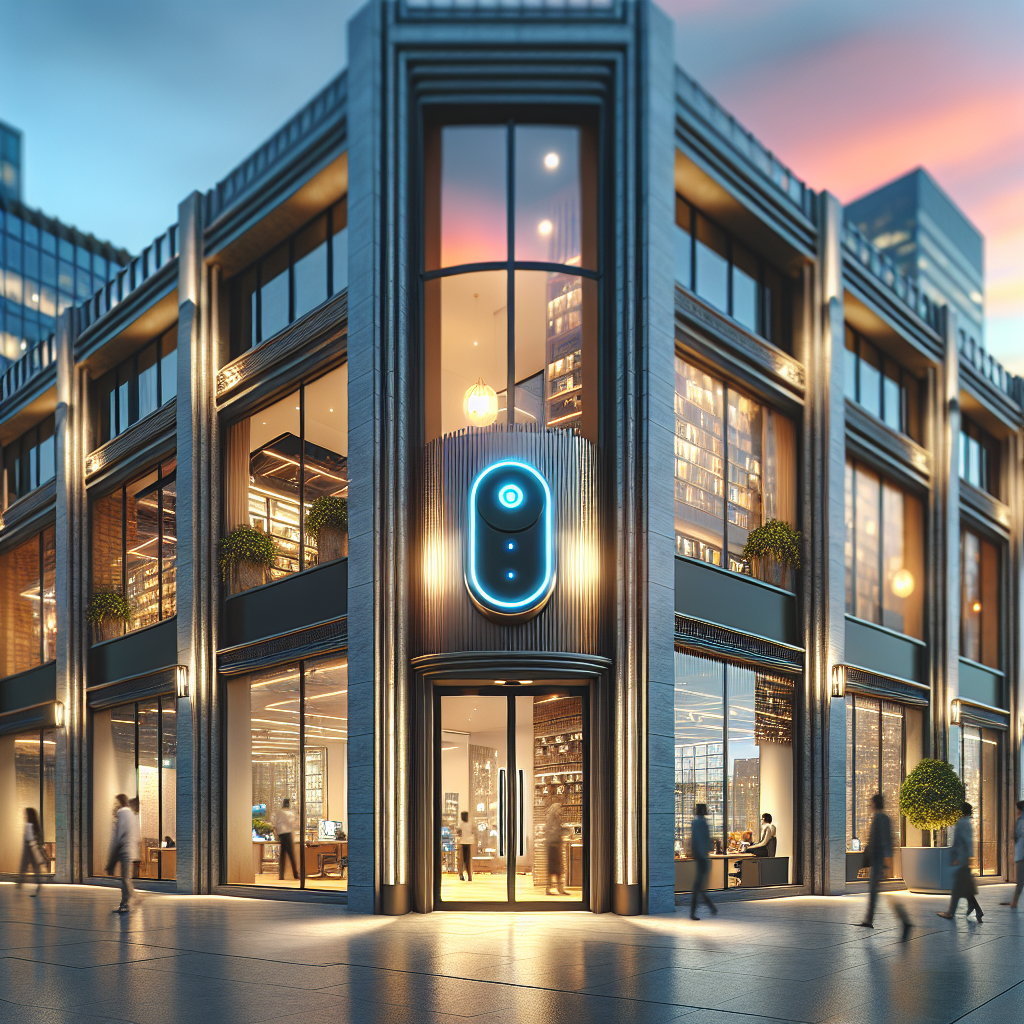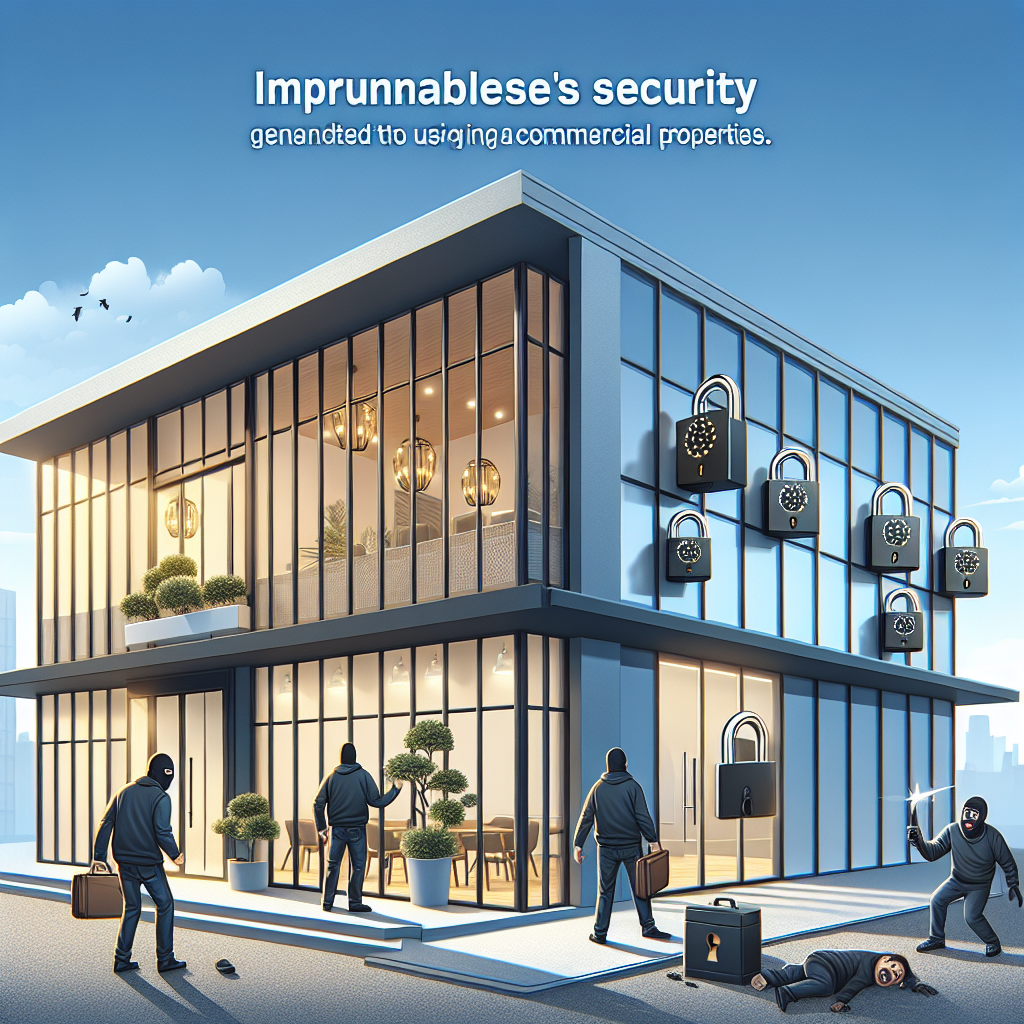As technology continues to revolutionize the way we interact with our surroundings, the integration of smart devices in commercial properties is becoming increasingly popular. One such innovation that is gaining momentum is the use of smart locks. These cutting-edge security systems offer a wide range of benefits for businesses, from increased convenience and flexibility to enhanced security and control. In this comprehensive guide, we will explore the numerous advantages that smart locks bring to commercial properties. Join us on this journey as we delve into the world of smart locks and discover how they can revolutionize the way businesses manage their security needs.
Understanding Smart Lock Technology
In the realm of commercial property security, smart lock technology has emerged as a sophisticated solution that combines convenience with enhanced safety measures. Understanding the intricate workings of smart locks is crucial for businesses looking to upgrade their security systems effectively.
Definition of Smart Locks
Smart locks are innovative devices designed to provide keyless access control to properties. Unlike traditional locks that rely on physical keys, smart locks utilize advanced technology such as Bluetooth, Wi-Fi, or RFID to grant or restrict access. These locks can be remotely controlled and monitored, offering property owners real-time visibility and management capabilities.
How Smart Locks Work
Smart locks operate through a combination of software, hardware, and connectivity features. When a user approaches a smart lock-equipped door, they can gain access through various methods such as entering a unique code on a keypad, using a mobile app to unlock via Bluetooth, or even employing biometric recognition like fingerprints or facial scans. These mechanisms work together seamlessly to authenticate users and unlock the door, all while logging the entry for security purposes.
Types of Smart Locks Suitable for Commercial Properties
-
Wi-Fi-Enabled Smart Locks: These locks connect directly to the property’s Wi-Fi network, allowing for remote access management from anywhere with an internet connection. They are ideal for businesses seeking centralized control over multiple entry points.
-
Bluetooth-Enabled Smart Locks: Utilizing Bluetooth technology, these locks offer proximity-based unlocking using smartphones or key fobs. They are suitable for businesses looking for secure yet convenient access control.
-
Keypad Smart Locks: Featuring a digital keypad for code entry, these locks are versatile and can accommodate multiple user codes. They are well-suited for businesses that require frequent access for employees or visitors.
By understanding the nuances of smart lock technology, commercial property owners can make informed decisions when selecting the most appropriate system for their specific security needs.
Advantages of Implementing Smart Locks in Commercial Properties

Smart locks offer a range of benefits that can significantly enhance the security and operational efficiency of commercial properties.
Enhanced Security Features
- Smart locks provide advanced encryption and authentication protocols, making them more secure than traditional key-based systems.
- Biometric authentication options such as fingerprint or facial recognition add an extra layer of security, reducing the risk of unauthorized access.
- Real-time monitoring and audit trails allow property managers to track who enters and exits the premises, enhancing overall security measures.
Remote Access and Monitoring Capabilities
- With smart locks, authorized personnel can remotely grant access to employees or visitors, eliminating the need for physical keys or on-site supervision.
- Property managers can monitor access logs and receive instant notifications of any suspicious activities, enabling quick response to potential security threats.
- Remote locking and unlocking features provide flexibility and convenience, allowing for efficient management of access control from anywhere at any time.
Integration with Other Smart Devices for Streamlined Operations
- Smart locks can be integrated with other smart building systems, such as security cameras and alarm systems, creating a comprehensive security infrastructure.
- Seamless integration with access control platforms enables centralized management of multiple entry points, simplifying administrative tasks for property managers.
- Automation capabilities, such as setting access schedules or customizing user permissions, streamline operations and enhance overall efficiency in commercial properties.
Factors to Consider When Choosing Smart Locks for Commercial Use
When selecting smart locks for commercial properties, several crucial factors must be taken into account to ensure the chosen system meets the specific needs of the business. The following considerations are essential for making an informed decision:
-
Durability and reliability
Smart locks intended for commercial use should be built to withstand the demands of a high-traffic environment. Look for locks constructed from robust materials that can endure frequent locking and unlocking without compromising security. Additionally, opt for smart locks with reliable mechanisms that minimize the risk of malfunctions or system failures. -
Compatibility with existing security systems
Integrating smart locks seamlessly with the current security infrastructure of the commercial property is paramount. Ensure that the chosen smart lock system is compatible with access control systems, surveillance cameras, and other security components already in place. This compatibility streamlines operations and enhances overall security effectiveness. -
Scalability for future needs
As commercial properties evolve and expand, the smart lock system should have the flexibility to grow along with the business. Select a smart lock solution that offers scalability, allowing for easy integration of additional locks or advanced features as the property’s security requirements change over time. This adaptability ensures that the investment in smart locks remains relevant and effective in the long term.

Installation and Maintenance of Smart Lock Systems
When considering the installation and maintenance of smart lock systems for commercial properties, it is crucial to weigh the options between professional installation and DIY approaches.
Professional Installation vs. DIY Options
Opting for professional installation ensures that the smart lock system is set up correctly from the outset. Professionals have the expertise to integrate the smart locks seamlessly with existing security systems, minimizing the risk of errors or malfunctions. On the other hand, a DIY installation may seem cost-effective initially, but it can lead to complications if not executed accurately.
Regular Maintenance and Troubleshooting Tips
To ensure the longevity and effectiveness of smart lock systems in commercial properties, regular maintenance is essential. This includes conducting routine inspections to check for any signs of wear and tear, ensuring that batteries are replaced promptly, and updating software as needed. Troubleshooting tips may involve resetting the system, checking connectivity issues, or seeking professional assistance for complex problems.
Upgrading Smart Lock Systems for Optimal Performance
As technology advances, upgrading smart lock systems becomes imperative to maintain optimal performance. Upgrades may include installing newer models with enhanced security features, integrating with advanced access control systems, or incorporating remote monitoring capabilities. By staying current with upgrades, commercial properties can benefit from the latest innovations in smart lock technology to bolster their security measures.
Addressing Security Concerns and Misconceptions
In the realm of commercial properties, smart locks have emerged as a cutting-edge solution to traditional security systems. However, with innovation comes skepticism, and it is essential to address common security concerns and misconceptions associated with smart locks.
Myth-busting Common Misconceptions about Smart Locks
One prevalent misconception is that smart locks are easily hackable, leaving properties vulnerable to intruders. Contrary to this belief, reputable smart lock manufacturers invest heavily in encryption technologies, making it extremely challenging for unauthorized individuals to compromise the system. Additionally, many smart locks come equipped with multi-factor authentication methods, adding an extra layer of security.
Ensuring Data Privacy and Encryption Protocols
Privacy concerns often deter property owners from adopting smart lock systems. To alleviate these worries, it is crucial to understand that top-tier smart lock providers adhere to stringent data privacy regulations. By implementing robust encryption protocols, sensitive information such as access codes and user data remains securely stored within the system, safeguarding against potential breaches.
Backup Measures in Case of System Malfunctions
Another common worry is the reliability of smart locks during system malfunctions or power outages. Smart lock technology has evolved to include fail-safe mechanisms that ensure continuous operation even in adverse conditions. From battery backups to manual override options, commercial properties can rest assured that their premises remain secure, regardless of any technical hiccups.

By dispelling these misconceptions and shedding light on the advanced security features of smart locks, commercial property owners can make informed decisions to enhance their security infrastructure.
Case Studies: Successful Implementation of Smart Locks in Commercial Settings
Real-world examples of businesses benefiting from smart lock technology
In a recent case study conducted by a leading security firm, a multinational corporation with multiple office locations implemented smart locks across its premises. The smart locks allowed for seamless access control, enabling employees to enter designated areas based on their permissions. This not only enhanced security but also improved operational efficiency by eliminating the need for physical keys or keycards.
Another notable example is a luxury hotel chain that integrated smart locks into its guest room management system. By utilizing smart locks with remote access capabilities, the hotel was able to offer guests a convenient and secure way to enter their rooms using mobile devices. This innovative approach not only elevated the guest experience but also reduced operational costs associated with traditional keycard systems.
Testimonials from commercial property owners/managers
According to a testimonial from a commercial property owner, the implementation of smart locks has revolutionized the way they manage access to their buildings. The ability to grant and revoke access remotely has provided them with a level of control and flexibility that was previously unattainable with traditional lock systems. Moreover, the advanced encryption technologies employed in smart locks have instilled confidence in both the property owner and tenants regarding the security of the premises.
Similarly, a property manager shared their positive experience with smart locks, emphasizing the ease of integration with existing security systems. The seamless compatibility of smart locks with access control solutions has simplified the management of multiple properties under their supervision. Furthermore, the real-time monitoring capabilities offered by smart locks have proven invaluable in ensuring compliance with safety regulations and addressing security breaches promptly.
Lessons learned from incorporating smart locks into security strategies
Through various case studies and testimonials, several key lessons have emerged regarding the integration of smart locks into commercial security strategies. One crucial lesson is the importance of selecting smart locks that align with the specific needs and operational requirements of the business. Customizable features such as user permissions, audit trails, and remote access capabilities play a significant role in maximizing the benefits of smart lock technology.
Additionally, the successful implementation of smart locks relies heavily on thorough training for staff members responsible for managing access control systems. Proper education on the functionalities and protocols associated with smart locks ensures smooth operation and minimizes the risk of security vulnerabilities. Moreover, regular maintenance and software updates are essential to uphold the integrity and effectiveness of smart lock systems in commercial properties.
FAQs: Exploring the Benefits of Smart Locks for Commercial Properties: A Comprehensive Guide
What is a smart lock for commercial properties?
A smart lock for commercial properties is a high-tech solution that allows owners and managers to securely control access to their buildings or offices. These locks can be remotely controlled through a smartphone app or computer, allowing for easy management of who can enter the premises at any given time. They often come equipped with additional features like keyless entry, activity logs, and the ability to grant temporary access to visitors.
What are the benefits of using smart locks in commercial properties?
There are numerous benefits to using smart locks in commercial properties. One key advantage is increased security, as smart locks offer advanced encryption and can be easily monitored for any suspicious activity. Additionally, they provide greater flexibility and convenience compared to traditional locks, allowing for easy access control management and the ability to grant access remotely to employees or contractors. Smart locks also eliminate the need for physical keys, reducing the risk of lost or stolen keys compromising the security of the property.
Can smart locks be customized to suit specific commercial property needs?
Yes, smart locks can be easily customized to suit specific commercial property needs. Owners and managers can program access levels for different employees, contractors, or visitors, ensuring that only authorized individuals can enter certain areas. Additionally, smart locks can be integrated with other security systems like cameras and alarms, providing a comprehensive security solution tailored to the unique requirements of the property.
Are smart locks cost-effective for commercial properties in the long run?
While the initial cost of installing smart locks may be higher than traditional locks, they can actually be more cost-effective in the long run. Smart locks eliminate the need for frequent rekeying and reduce the risk of unauthorized access, potentially saving property owners money on locksmith services and security breaches. Additionally, their advanced features like remote access control and activity logs can help optimize operational efficiency and prevent costly security incidents. Overall, smart locks offer a valuable investment for commercial properties looking to enhance their security and streamline access control processes.